

Copyright Basics: Crash Course Intellectual Property 2 (from CrashCourse) 17 U.S. Code § 102 - Subject matter of copyright: In general. House report no. 94–1476 Original Works of Authorship.
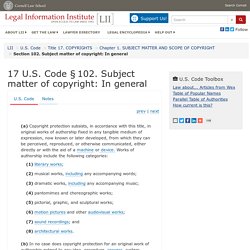
The two fundamental criteria of copyright protection—originality and fixation in tangible form are restated in the first sentence of this cornerstone provision. The phrase “original works or authorship,” which is purposely left undefined, is intended to incorporate without change the standard of originality established by the courts under the present copyright statute. The public domain and 5 things not covered by copyright (from Creative Commons) We’re taking part in Copyright Week, a series of actions and discussions supporting key principles that should guide copyright policy.
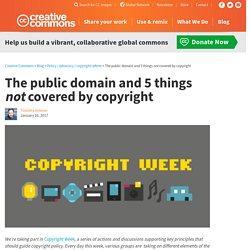
Every day this week, various groups are taking on different elements of the law, and addressing what’s at stake, and what we need to do to make sure that copyright promotes creativity and innovation. Today’s topic for Copyright Week is “Building and Defending the Public Domain”. We know that the public domain is our cultural commons and a crucial resource for innovation and access to knowledge. Copyright policy should strive to promote, and not diminish, a robust, accessible public domain. Advocacy, Legislation & Issues (from ALA) Copyright tools can help libraries and others to be more comfortable with their work to interpret the limitations and exceptions to the exclusive rights granted to the copyright holder under U.S.
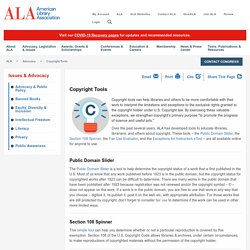
Copyright law. By exercising these valuable exceptions, we strengthen copyright’s primary purpose "to promote the progress of science and useful arts. " Over the past several years, ALA has developed tools to educate libraries, librarians, and others about copyright. Tales from the Public Domain: A comic explaining copyright law (from the Center for the Study of the Public Domain at Duke University) About CC Licenses: 6 Different Creative Commons License Options (from Creative Commons) Creative Commons licenses give everyone from individual creators to large institutions a standardized way to grant the public permission to use their creative work under copyright law.
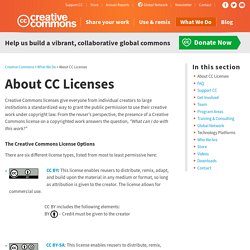
From the reuser’s perspective, the presence of a Creative Commons license on a copyrighted work answers the question, “What can I do with this work?” There are six different license types, listed from most to least permissive here: CC BY: This license allows reusers to distribute, remix, adapt, and build upon the material in any medium or format, so long as attribution is given to the creator.
The license allows for commercial use. CC BY includes the following elements: BY – Credit must be given to the creator CC BY-SA: This license allows reusers to distribute, remix, adapt, and build upon the material in any medium or format, so long as attribution is given to the creator. CC BY-SA includes the following elements: BY – Credit must be given to the creator SA.
Frequently Asked Questions (from Creative Commons) These FAQs are designed to provide a better understanding of Creative Commons, our licenses, and our other legal and technical tools. They provide basic information, sometimes about fairly complex topics, and will often link to more detailed information. Other CC FAQs: CC0 Public Domain Dedication and Public Domain Mark. “Licensor”, “rights holder”, “owner”, and “creator” may be used interchangeably to refer to the person or entity applying a CC license.Information about the licenses is primarily made with reference to the 4.0 suite, but earlier license versions are mentioned where they differ.Have a question that isn’t answered here? Contact info@creativecommons.org. Creative Commons does not provide legal advice. Creative Commons: Free Photos for Bloggers (Infographic by foter.com) What Does "Creative Commons" Mean? (YouTube Explanation from Techquickie)
More Information on Fair Use (from Copyright.gov) Fair use is a legal doctrine that promotes freedom of expression by permitting the unlicensed use of copyright-protected works in certain circumstances. Section 107 of the Copyright Act provides the statutory framework for determining whether something is a fair use and identifies certain types of uses—such as criticism, comment, news reporting, teaching, scholarship, and research—as examples of activities that may qualify as fair use.
Section 107 calls for consideration of the following four factors in evaluating a question of fair use: Purpose and character of the use, including whether the use is of a commercial nature or is for nonprofit educational purposes: Courts look at how the party claiming fair use is using the copyrighted work, and are more likely to find that nonprofit educational and noncommercial uses are fair. In addition to the above, other factors may also be considered by a court in weighing a fair use question, depending upon the circumstances. Copyright, Exceptions, and Fair Use: Crash Course Intellectual Property #3 (from CrashCourse) Fair Use Evaluator (from ALA Office for Information Technology Policy) Educational Exemptions in the U.S. Copyright Code (from ALA Office of Information Technology Policy) The U.S.
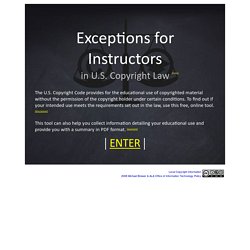
Copyright Code provides for the educational use of copyrighted material without the permission of the copyright holder under certain conditions. To find out if your intended use meets the requirements set out in the law, use this free, online tool. [disclaimer] This tool can also help you collect information detailing your educational use and provide you with a summary in PDF format. [example] This tool is valid for those uses that meet the requirements and which take place within the United States. THIS TOOL IS:Intended as a source of information for educators & others to better understand the educational exemptions available in the U.S. THIS TOOL IS NOT: A source of legal advice. Frequently asked copyright questions - YouTube Help. Before you upload a video to YouTube, you must get the rights to all elements in your video.
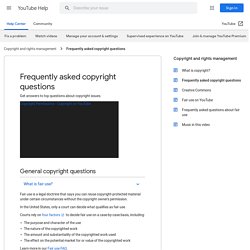
These elements include any music (even if it’s just playing in the background), video clips, photos, and so on. First, reach out to the copyright owners or rightsholders directly and negotiate the appropriate licenses for your use. Then, check the license. With Remote Learning Still the Norm, Publishers Extend Permissions for Read Alouds. Literary Works: Registration (from Copyright.gov) Important Note: You may register up to 10 unpublished works on the same application, but YOU MUST SELECT the new application for a “Group of Unpublished Works.”
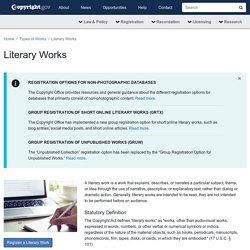
Click here if you need help finding the application for a “Group of Unpublished Works,” and click here to watch a video that provides step-by-step instructions for completing this application. How to Copyright a Book (from Legalzoom.com) From the moment an author puts words to paper—or computer screen—that work is, technically, protected.
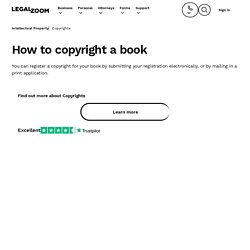
However, proving ownership of a copyright, and protecting it, is another matter. That requires registration with the federal government. How Copyright Protects a Book The name says it all—copyright is the right to copy a work, and it prevents others from doing so. For example, copyright prevents bookstores from buying one book from the author, making copies, and then selling them to its customers. Copyright Protection for Periodicals Newspapers and Magazines (from Mighty Recruiter) For the First Time in More Than 20 Years, Copyrighted Works Will Enter the Public Domain. “Whose woods these are, I think I”—whoa!
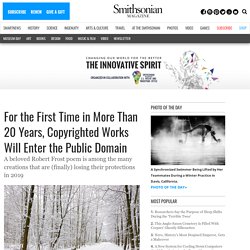
We can’t quote any more of Robert Frost’s “Stopping by Woods on a Snowy Evening,” because it is still under copyright as this magazine goes to press. But come January 1, 2019, we, you, and everyone in America will be able to quote it at length on any platform. At midnight on New Year’s Eve, all works first published in the United States in 1923 will enter the public domain. It has been 21 years since the last mass expiration of copyright in the U.S. That deluge of works includes not just “Stopping by Woods on a Snowy Evening,” which appeared first in the New Republic in 1923, but hundreds of thousands of books, musical compositions, paintings, poems, photographs and films. Motion Pictures: Registration (from Copyright.gov) Important Note: You may register up to 10 unpublished works on the same application, but YOU MUST SELECT the new application for a “Group of Unpublished Works.”
Click here if you need help finding the application for a “Group of Unpublished Works,” and click here to watch a video that provides step-by-step instructions for completing this application. The “Standard Application” MAY NOT BE USED to register a “collection” of unpublished works. If you submit 2 or more works on the “Standard Application” the Copyright Office may register only 1 of your works and remove the remaining works from the claim. To register those works you will need to resubmit them using an appropriate application form. Motion Pictures are works that contain a series of related images that are intended to be shown with a projector, digital display, or other device. Works Commonly Registered In This Category. 9 Copyright Laws Every Video Producer Should Know - Videomaker. Copyright law is federal law and does not vary from state to state.
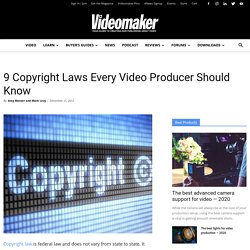
It protects your video and every individual piece of that video. The protection occurs automatically and immediately when the video is fixed in a tangible medium. Once you’ve created your video, only you, the copyright owner, can give permission to others to copy the video, to distribute copies of the video by sale, rent, lease, or other transfer of ownership, to prepare derivative works based upon the video or its contents, or to perform (i.e., show) the video publicly.
Copyright Registration for Motion Pictures, including Video Recordings (from Copyright.gov) Using Video Without Permission - Copyright and Using Video - Research Guides at University of Michigan Library. How to search copyright records online (from YouTube channel Steve Vondran) The Recorded Performance - Copyright. Performance Rights (from Stageplays.com) Copyright law is complicated, but unless the author has been dead for at least 70 years you should expect to pay Performance Royalties You must also have prior permission from the author or their agent, and you should not assume that because a Play has been published that it's therefore available for performance And unless you're performing in a private home or a classroom, a Performance Royalty will be due whether or not the Play is performed in whole or in part, whether or not it's for charity, and whether or not the audience pays admission Photocopying scripts without permission is also a breach of copyright And you cannot cut or edit an author's work without their express permission (which will usually be refused) The cost of the Rights varies, but as a rough guide, for Amateur Rights you should expect to pay about $100.00 (£60+VAT) per performance and for Professional Rights about 10% gross box-office In short, please give yourself plenty of time.
Copyright Laws and School Performances (from LegalZoom) No doubt you've sat through (and maybe even enjoyed) at least one school play or recital. Every year, schools perform well-known plays and songs for their communities, often using ticket sales to raise much-needed funds. In almost every one of those performances, the material being performed is under copyright—it's the intellectual property of a person or company that probably depends on its use to generate income. So what are the legal ramifications of putting on a copyrighted play? Do you need copyright permission?
Copyright Registration for Sound Recordings (from copyright.gov) How Copyright Works: Musical Composition Copyright and Sound Recording Copyright. Copyright Laws for 30 Seconds of Music (from Houston Chronicle) By Scott Shpak Updated March 05, 2019 As a business owner or entrepreneur looking for bang-for-your-buck advertising, you know that a short clip of a high-profile hit is a powerful attention-getter. Visual Arts: Registration. Comic Books & US Copyright Law (from Paul & Paul) The passing of Stan Lee has many thinking about comic books and our culture.
Here's a look at how comic books affect U.S. Work Made For Hire: Who Owns The Copyright? A Guide to the Visual Artist's Right's Act (from Cynthia Esworth at Harvard Law) By Cynthia Esworthy NEA Office of General Counsel, JD Washington & Lee Law School 1997 You are a sculptor. On commission, you create a bronze frieze for a city park. A year later, you discover that the center of the frieze has been covered by a copy of the city seal.